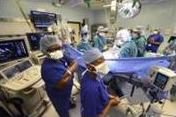Advertisment
ACC 2014 Report: Intra-aortic balloon pump may have broader potential

The most frequently used mechanical circulatory assist device in the world may have untapped potential, physicians say. One of many uses for the intra-aortic balloon pump is helping ensure adequate oxygen and blood delivery to a heart struggling to resume beating in the aftermath of coronary bypass surgery, said Dr. Mary Arthur, cardiovascular anesthesiologist at the Medical College of Georgia and Georgia Regents Health System.
However physicians have been advised not to use the balloon pump if heart surgery patients also have aortic insufficiency. That’s when the aortic valve’s inability to close completely prompts oxygen-rich blood to backwash into the left ventricle. The heart chamber that pumps blood out to the body can get large and inefficient as a result.
Now, Arthur and her team report that the balloon pump enabled them to wean a 63-year-old man with moderate aortic insufficiency off bypass when standard approaches failed.
“This tells us that the intra-aortic balloon pump may be an option for patients with mild to moderate aortic insufficiency who don’t have severe atherosclerosis in their aorta, and whose left ventricular dysfunction is reversible,” Arthur said.
Dr. Tiffany Richburg, anesthesiology resident at MCG and the Georgia Regents Health System, presented the case Saturday during the Society of Cardiovascular Anesthesiologists’ 36th Annual Meeting and Workshops in New Orleans.
“The pumps are listed in every textbook as contraindicated in these patients,” Arthur said. “But we felt like we had no other option. The patient continued to deteriorate despite maximal support.”
Said Richburg, “We had a difficult time weaning him off bypass: his blood pressure was extremely low, his cardiac output was extremely low, and his heart was not pumping well.” The patient was immediately placed back on bypass.
Sluggish hearts can occur following bypass surgery, where anesthesiologists essentially put the heart to sleep to dramatically decrease its metabolism and protect it during the procedure. Arthur quickly ran through the laundry list of drugs to help jump-start this patient’s heart, and even used electric shock to help correct an irregular rhythm.
“Once you go back on bypass you have to start thinking: What do I need to do differently to get him off bypass?” Arthur said. “We felt this was his best option.” Added Richburg, “We had to make sure his heart did not sustain more damage from not getting enough oxygen.”
The patient had experienced a heart attack and had a history of diabetes and asthma. His aortic insufficiency was found during the usual cardiac workup before surgery to bypass his four diseased coronary arteries.
MCG Heart Surgeon Vijay Patel inserted the intra-aortic balloon pump through the femoral artery in the groin up into the aorta, the largest blood vessel in the body, to help strengthen the left ventricle. When inflated, the balloon can also increase leakiness around the aortic valve, which is why it’s not recommended with aortic insufficiency.
“It completely worked,” Richburg said. Almost immediately, the patient’s blood pressure and cardiac output increased and his heart started beating stronger. The physicians were able to take him back off bypass and to intensive care with the balloon still in place. They removed the balloon the next morning.
While she now considers the pump a reasonable last option for this very specific group of patients, Arthur wants to do a small clinical trial to ensure that the findings continue to hold.
Causes of aortic insufficiency include congenital defects, endocarditis, trauma to the aorta near the valve, rheumatic fever, lupus, calcium buildup that can occur with age, and a type of arthritis called ankylosing spondylitis.
For more information: http://www.eurekalert.org/multimedia/pub/70971.php?from=263916
Contact: Toni Baker
tbaker@gru.edu





